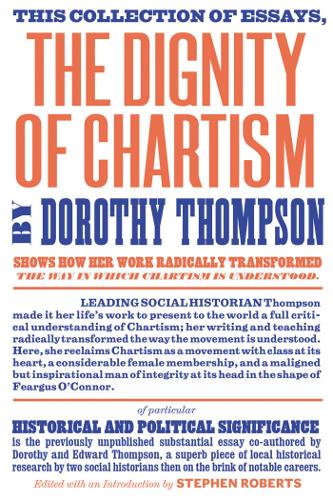 Dorothy Thompson, who died in 2011, was a leading historian of the Chartist movement - the popular working-class movement, active from the 1830s to the late 1850s, which agitated for universal male suffrage and parliamentary reforms such as a secret ballot, payment for MPs and equal-sized constituencies. In addition, both she and her husband, the labour historian EP Thompson, were leading members of the Communist Party until 1956, when they left in protest at the Soviet Union’s invasion of Hungary. The Dignity of Chartism collects a number of essays written by Thompson about Chartism.
Dorothy Thompson, who died in 2011, was a leading historian of the Chartist movement - the popular working-class movement, active from the 1830s to the late 1850s, which agitated for universal male suffrage and parliamentary reforms such as a secret ballot, payment for MPs and equal-sized constituencies. In addition, both she and her husband, the labour historian EP Thompson, were leading members of the Communist Party until 1956, when they left in protest at the Soviet Union’s invasion of Hungary. The Dignity of Chartism collects a number of essays written by Thompson about Chartism.
In his introduction, Stephen Roberts, a labour historian taught by Dorothy Thompson, proves an able and passionate guide to her work, explaining how she advocated a class-based understanding of Chartism and her stress on the important role played by women in the movement. Thompson was also keen to highlight the regional differences in how Chartism developed across the country, with her lengthy case study of the experience in Halifax – which included demonstrations of perhaps 20,000 people during peak periods of ferment – a particular highlight.
The book assumes a high level of knowledge concerning Chartism, so those looking for a general introduction should look elsewhere. Nevertheless this somewhat hodge-podge collection of essays does provide a tantalising, often exciting, glimpse into one of the most important social movements in British history – and it therefore has some interesting information for activists today.
Who knew, for example, that in response to the huge Chartist demonstration in London in 1848 the Queen was evacuated to the Isle of Wight? Elsewhere, Chartist leader Feargus O’Connor seems to be anticipating the idea of a Citizen’s Income when he argues that the vote must be accompanied by the popular ownership of small farms, enabling a basic level of living and thus empowering workers when bargaining for their labour power.
Peace activists will be interested to read Thompson’s explorations of why the movement faded out and what its lasting achievements were, as well as her discussions of ‘moral force’ Chartism (that is, nonviolent protest) versus ‘physical force’ Chartism. (In addition to the huge petitions, signed by millions of people, that were submitted to parliament in 1839, 1842 and 1848, there was also a failed armed rebellion – that was supposed to trigger a national uprising – in Newport, Wales, in 1839.)
Finally, there is a well-thought-out ‘Further Reading’ section for those who wish to explore this inspiring popular movement further.


